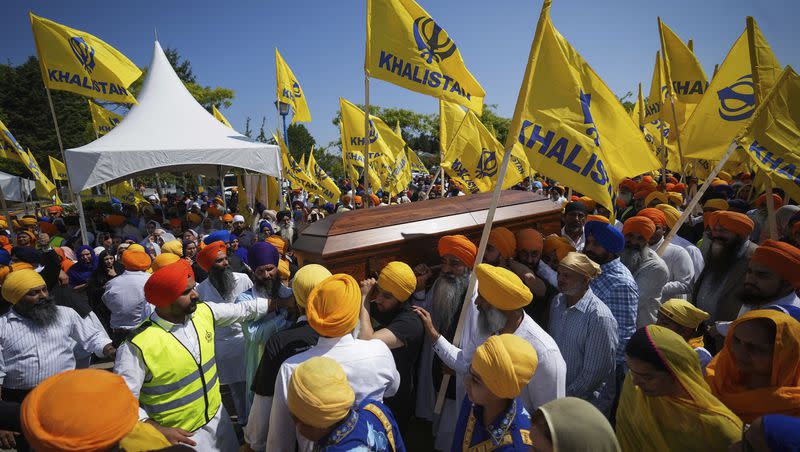Canada accused Indian government of an assassination, India refuted the allegations

- Oops!Something went wrong.Please try again later.
- Oops!Something went wrong.Please try again later.
Diplomatic relations between India and Canada are strained over the assassination of a prominent Sikh political activist.
Canadian Prime Minister Justin Trudeau on Tuesday claimed during remarks in Parliament that authorities are investigating “credible allegations” that “agents of the government of India” were responsible for the killing of Hardeep Singh Nijjar, a Sikh Canadian citizen.
“Any involvement of a foreign government in the killing of a Canadian citizen on Canadian soil is an unacceptable violation of our sovereignty,” he said.
Canada is home to the largest Sikh community outside of India, with more than 770,000 Sikh Canadians.
“We are simply laying out the facts as we understand them and we want to work with the government of India to lay everything clear and to ensure there are proper processes,” Trudeau said. Canadian authorities have not made this evidence public.
Related
India rejects Canada’s accusations
Trudeau said he raised the issue with Indian Prime Minister Narendra Modi during the G20 summit in New Delhi. A few days following the summit, Canada postponed an October trade mission to India.
The Indian Ministry of External Affairs rejected Trudeau’s accusations and called them “absurd and motivated” in a statement. The ministry added that Canada has been providing shelter to “Khalistani terrorists and extremists” who “threaten India’s sovereignty and territorial integrity.”
Nijjar was shot in a parking lot of a gurdwara, a Sikh temple, in British Columbia back in June. He was a leader in the Sikh separatist movement, which calls for establishing Khalistan, an independent state out of a part of India.
In 2016, Nijjar dismissed reports from the Indian media about his involvement in a terrorist group, saying that his record is clean and that he owns a plumbing business, according to The Associated Press.
Related
India, Canada issue travel advisories
Both India and Canada have issued travel advisories this week.
The Indian government urged travelers “to exercise utmost caution” amid “growing anti-India activities and politically-condoned hate crimes and criminal violence in Canada.”
The notice, uploaded by a spokesperson of the External Affairs Ministry, also advised Indian students in Canada to be cautious. Nearly 320,000 Indian students are enrolled in Canadian colleges and universities.
Aljazeera reported that Canadian Public Safety Minister Dominic LeBlanc responded to India’s travel advisory.
“Canada is a safe country,” he said, while the country updated its travel information about India, which now warns travelers to “exercise a high degree of caution” because of “the threat of terrorist attacks.”
Related
After a 2-year confirmation battle, newly sworn-in Ambassador Eric Garcetti starts work in New Delhi
India, Canada expel diplomats
Canada expelled an Indian diplomat Pavan Kumar Rai, the head of a research and analysis ring at RAW, India’s foreign intelligence agency. India followed suit and asked a Canadian diplomat to leave.
Trudeau has raised the issue with President Joe Biden and U.K. Prime Minister Rishi Sunak. White House National Security Council spokesperson Adrienne Watson said the allegations from Trudeau were deeply concerning.
“We remain in regular contact with our Canadian partners. It is critical that Canada’s investigation proceed, and the perpetrators be brought to justice,” Watson said.
Modi has demanded that Canada control the Sikh emerging separatist movement, which was banned in India after an insurgency broke out in the 1970s and 1980s.
Related
Will Canada earn support from its allies?
According to The New York Times, multiple countries, that are a part of the Five Eyes intelligence alliance, including U.S., Britain and Australia, provided evidence against India.
But these countries haven’t made any statements to support Canada’s allegations and denounce the killing.
“India is important in Western calculations for balancing China, and Canada is not,” Stephanie Carvin, a professor of international relations at Ottawa’s Carleton University, told Reuters. This is especially true as Modi and Biden work to strengthen diplomatic ties between their two countries, having announced a series of investments during Biden’s visit to India in early September.
“This really does put Canada offside among all other Western countries,” Carvin said.
Related

